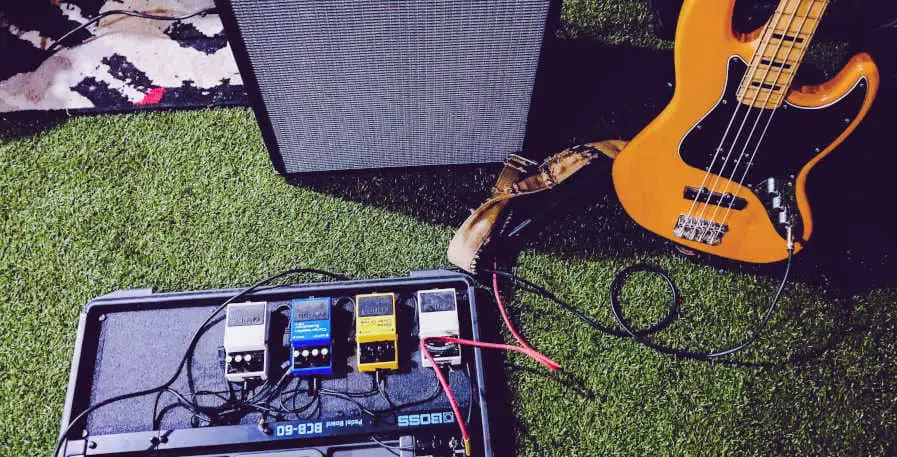It might be for a vacation, or it might for a gig, but you want to bring you bass guitar with you on a plane. It thus helps a lot to know what you can and cannot do when travelling with your bass. First of all, can you bring an electric bass on a plane?
In general, bringing an electric bass guitar with you on a plane is of no issue. Airlines are used to accommodating musicians and cannot legally withhold you from bringing your bass onboard unless there is a lack of space or it cannot be stored safely.
So yes, you can bring your bass with you on a plane. However, you want to be mindful of whether you bring it as a carry-on or check it in. In both of these cases, there are things you should be mindful of.
Therefore, I have written this article to tell you all you need to know about flying with your bass guitar. You will learn whether to check it in or bring the bass as carry-on luggage. I will also show you what airlines you should opt for, and how to keep your bass safe when flying.
Can I bring my electric bass as a carry-on?
The Modernization and Reform Act of 2012 states that airlines must permit passengers to bring a musical instrument into the aircraft cabin if it can be stored safely under a seat or in a baggage compartment. If these criteria are met, you can bring your bass guitar as carry-on luggage, without being charged extra for it.
I am a bassist, not a lawyer. This is not legal advice.
So If a plane has enough space for you to safely store your instrument on it, they are legally obliged to let you bring it on board. Thus, bringing your bass into the aircraft cabin will rarely be an issue. The bill is available here, and flying with musical instruments is covered under section 403.
You can also ask if it would be possible to store your bass in one of the closets on the plane. These are generally located at the front and back of the aircraft. This is generally safer for your bass, and I would choose to do this over storing my bass in a baggae compartment.
It also helps a lot to be nice to the staff members when discussing bringing your bass as a carry-on. If you meet resistance, chances are good that they are not aware of the abovementioned bill, or they do not know how damaging check-in could be to a bass.
Furtheremore, unless you want your bass to have its own seat on the plane, do not pay extra for bringing it with you. An airline cannot legally charge you for bringing your bass guitar along as carry-on luggage.

Should I check or carry on my bass guitar?
As a general rule, you should bring your bass guitar as carry-on whenever possible. Checking in your bass guitar will make it significantly more prone to getting damaged, lost, or stolen. There is also generally an added cost to checking in your bass, whereas carry-on will be free.
I would never check in my bass unless it was absolutely impossible for me to avoid it.
It is a best practice to never leave your instrument with strangers. While few baggage handlers will go out of their way to damage your instrument, many of them will not be familiar with how fragile your instrument is.
The baggage area where checked-in luggage is stored is temperature-controlled. It will however get colder than the aircraft cabin. Thus, checking in your bass exposes it to much of the same issues that leaving it in a car does. This will be particularly problematic on longer lights.
Related reading: Leaving Your Bass Guitar In The Car
If you ever check in your bass, make sure that it is properly protected. Even if you keep the bass is in a case, make sure to wrap the case in plastic. If the bass is kept in a gig bag make sure to wrap it extra thoroughly with multiple layers.
Will a bass fit in the overhead compartment?
In general, a long-scale bass guitar will fit into overhead compartments on commercial airplanes. In cases where the bass does not fit into the overhead compartment, you can generally store the instrument in a closet at the front of the plane.
I`ve never had a problem fitting my bass into an overhead compartment. While some planes will have smaller compartments than others, this will rarley be an issue.
However, you do want to be mindful of whether other passengers will be storing luggage in the same overhead compartment as you. Avoid storing your bass at the bottom of an overhead compartment if you know other people will put their luggage on top of it. This will be horrible for your bass, and non-musicians are rarely mindful of this.
Communicating with the other passengers that are using the same overhead compartment as you goes a long way. People will generally be okay with letting you store your bass on top of their luggage to not risk damaging your instrument.
Note: Basses are commonly measured in scale length, rather than the total length of the instrument. Thus, make sure that you measure the whole length of your bass before flying. This will make it easier to communicate exactly how much space you will need. To learn more read: Why are Basses so Long?

Best airlines for musical instruments
The FIM (International Federation of Musicians) has ranked 114 airlines after how well they accommodate musicians. This ranking is based on the policies of the airlines.
Airlines were either ranked green, orange, or red after how accommodating they are. Out of 114 airlines, 10 received the best rating of green. Thus, if you have the option of using any of these 10 airlines, I recommend doing so:
- American Airlines
- Delta Airlines
- United Airlines
- JetBlue
- El Al
- Southwest Airlines
- Air Canada
- Air Dolomiti
- Brussels Airlines
- Alaska Airlines
Out of the 104 other airlines, 66% were ranked red and 33% were ranked orange. Thus, if you cannot opt for one of the airlines above, I would recommend taking a look at their list and choosing one of the ones ranked orange whenever possible.
Bass flight cases
When flying with your bass, it is a good idea to use a flight case. These cases make sure that your instruments are protected during flights and have TSA-approved locks.
Flight cases are especially useful if you fly often, are a touring musician, or elect to check in your bass. To me, anything that will help protecting my bass on the road is a worthwhile investment.
You can find flight cases in different sizes that accommodate the vast majority of bass guitars. Just like regular cases, they also differ greatly in price. Personally, I consider it more important to have one at all, than having a premium one.
Conclusion
So can you bring a bass guitar on an airplane? Absolutely. Airlines are used to musicians bringing their instruments with them and will accommodate you well most of the time.
It is much preferable to bring your bass as a carry-on rather than checking it in. Airlines are even legally obliged to let you bring your bass as a carry-on, as long as they have space for it and it can store it safely.
Before flying, it is a good idea to check your airline’s policies regarding musical instruments. Some are better than others, but bringing your bass along will rarely be an issue.
It is a good idea to get yourself a flight case for your bass when traveling. This will ensure that your bass stays safe during the flight and that it is secured with a TSA-approved lock.
Due to their smaller size, headless basses are by far the best bass guitars to fly with. If you are going to travel with your bass often, I recommend reading about the advantages of headless basses.

